Joy's Story: Part 3 - A Difficult Decision

Read parts one and two of Joy's story that detail her life in North Korea and how she was sold as a bride in China.
When I started living with the Chinese man I was sold to, I thought of escaping after six months. I just did what the Chinese man wanted without thinking about birth-control—I never had proper sex education. Two months later, he and his family took me to a hospital for a pregnancy test. I was pregnant. I am so sorry to my daughter for this, but after I got pregnant was so miserable and I felt like I was stuck in this situation because of the baby. I knew that I couldn’t escape until I gave birth to my daughter and raised her for a while. I was not happy, but the Chinese man and his family were. I am very sorry to my daughter for how I felt about having her back then, but the pregnancy was not what I wanted and I didn’t love the Chinese man. I actually tried to abort the baby by jumping down from a high tree many times but it didn’t happen.
I ended up having a daughter and raised her for two years before I escaped.

When I was still raising my daughter and living with the Chinese man and I was losing hope about my life, the North Korean broker who sold me into marriage got back to me and introduced me to some people who later connected me to LiNK’s network. She told me that she felt really bad for selling me to the Chinese man but she had to do it to survive in China as a North Korean herself. When she told me about going to South Korea and life there, I felt like that was my last chance to have my life back again. At that point, I was no longer breastfeeding and my baby had started to talk, so I thought the Chinese man’s parents could take care of her. I decided to leave for South Korea.
I was so sad to leave my two-year-old daughter in China.
Before I left, I thought of taking her with me, but she was still very young and I was not sure if I was going to make it to South Korea safely so I didn't want to risk her life.
To this day I feel guilty and sorry about having left her so I could have freedom and better life. I know my daughter has been hurt a lot by my leaving.

Before I started moving to get out of China I stayed with some other defectors before I got connected to LiNK's network. At the time, I cried every day thinking of my daughter. Even when I was sleeping in the house, I kept waking up to see if my little daughter was sleeping well on my arm and realized that she was not with me anymore.
I didn't want to cry in front of other defectors, so I cried behind a curtain and I found another North Korean woman crying there because she also left her child. We ended up hugging each other and crying together.
Since I resettled to South Korea a few years ago, I have been talking with my daughter through online video calls as often as possible. She is doing well and is now in elementary school, but I can tell she has been so hurt by my absence in her life. It breaks my heart when she asks me why I am not with her. Whenever there is homework about family or whenever her teacher asks her to bring her mom, she gets so sad and I feel so helpless and remorseful. I plan to visit her in China on one of my summer breaks from college.
It is so ironic because I was so hurt a lot by my mom for leaving me and my family when I was a little kid and I did the same thing to my own daughter.
Now I understand why my mom had to make such a decision...Hopefully there will be a day my daughter can understand and forgive me.
How A North Korean Defector Sends Money Back Home
It may seem like North and South Korea are completely cut off from each other, but even after decades of separation, channels of communication persist. Defectors who have made it to freedom are bridging the gap, connecting people inside North Korea to the world beyond. Through extensive broker networks, they send back money and information, accelerating change in the world’s most authoritarian country.
Through this process known as remittances, millions of dollars are sent into the country every year, representing huge spending power. Here’s how they do it!
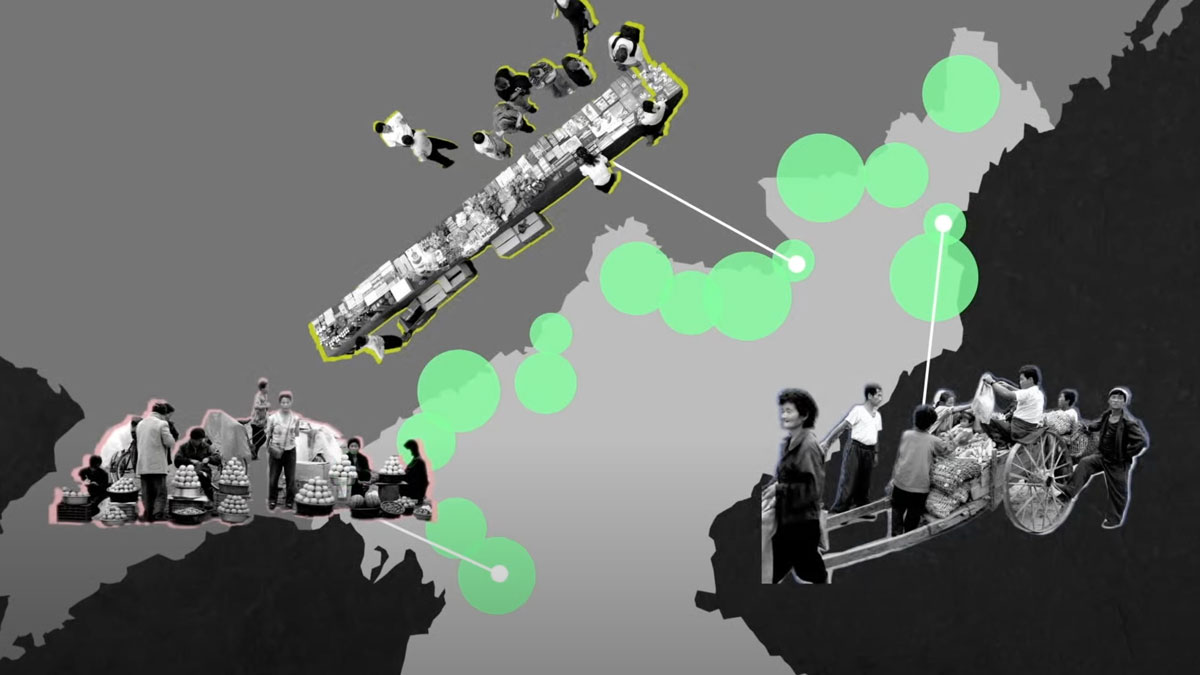
Reconnecting with Family
To send money back home, North Korean refugees must first contact their families. They hire brokers to find their relatives and arrange illicit phone calls close to the border with China, where smuggled Chinese cell phones can connect to international networks. In North Korea, people are often wary of such brokers, so they may have to be convinced with codewords or childhood nicknames that only the family would know, or recognizable handwriting and photos.
To avoid being caught, contact is often made from the mountain at night, or using a series of text or voice messages sent through apps like Wechat and quickly deleted. When the call finally happens, it can be emotional for both sides.
“You hear someone say, ‘Okay you’re connected, you can speak now.’ But no one says anything to each other. You just hear a high-pitched tone, and silence. Could this be real? You’re just crying, and can’t even speak.”
– Miso, escaped North Korea in 2010
How Remittances Work
There are different ways to send money to North Korea, but a simple version involves three parties: A North Korean resettled in South Korea, a remittance broker in North Korea, and the recipient in North Korea.
- A resettled North Korean, makes a request to a remittance broker to arrange a transfer. They wire money to a Chinese account controlled by that broker.
- The remittance broker in North Korea uses a smuggled Chinese phone to confirm receipt of the funds.
- After taking a hefty commission, they give cash to the refugee’s family. The family can confirm receipt of the money by sending a photo, video, or voice message back, so the sender can be confident that they’ve not been scammed.
With this process, the remittance broker in North Korea occasionally needs to replenish their cash on hand. This could happen through the physical smuggling of cash, but oftentimes money from their Chinese bank account is used to buy goods in China that are then sold in North Korea, generating cash. In this way, physical money never actually has to cross borders.
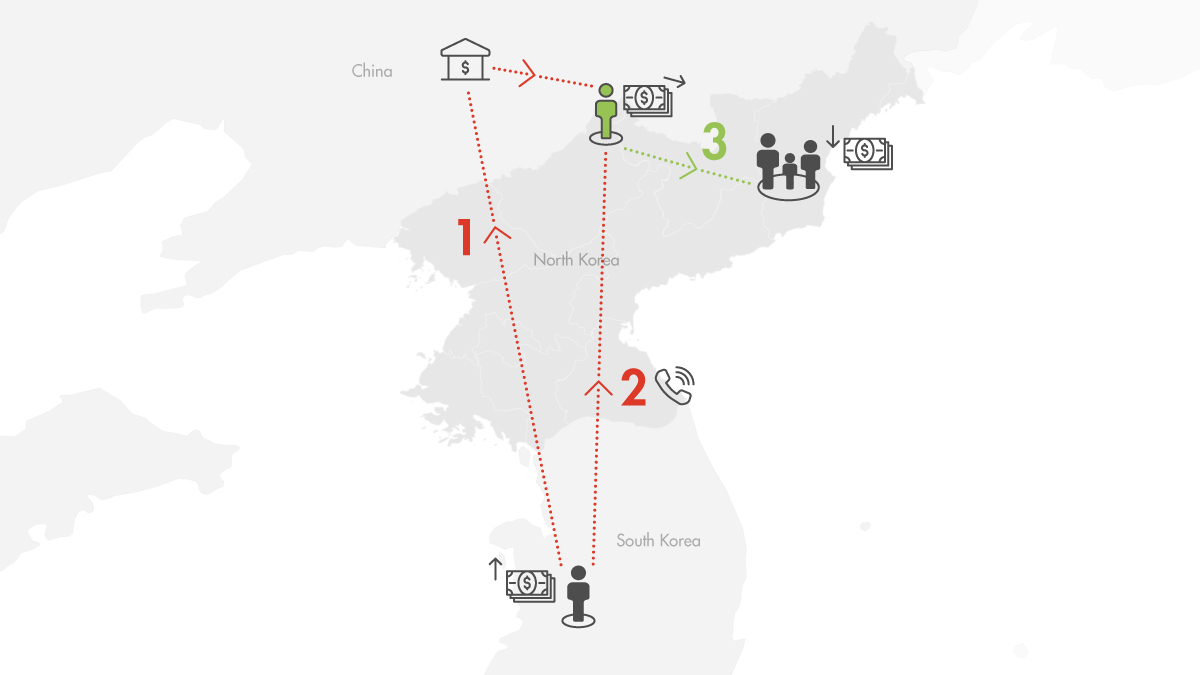
The Power to Change Lives
North Korea is one of the poorest countries in the world, whereas South Korea is one of the richest. Therefore remittances from relatives in South Korea or elsewhere can be absolutely transformative. The money is spent on almost everything, including food, clothing, shoes, medicine, housing, transport, and bribes to keep the family safe.
“I’ve sent money back to North Korea ever since I resettled in South Korea. I send an average of $1,500 a year. My parents used the money to buy a house! They’re also going to use it to help my younger brother escape and come to South Korea.”
– Jeonghyuk, resettled North Korean refugee
With new resources also comes new opportunities. North Koreans who never had the means before can now think about starting a business at the Jangmadang, or market. Since the collapse of the regime’s socialist economy in the 1990s, the markets have become essential to making a living. The flow of remittances is increasing trade, food security, marketization, and entrepreneurship, empowering ordinary North Koreans to gain autonomy.
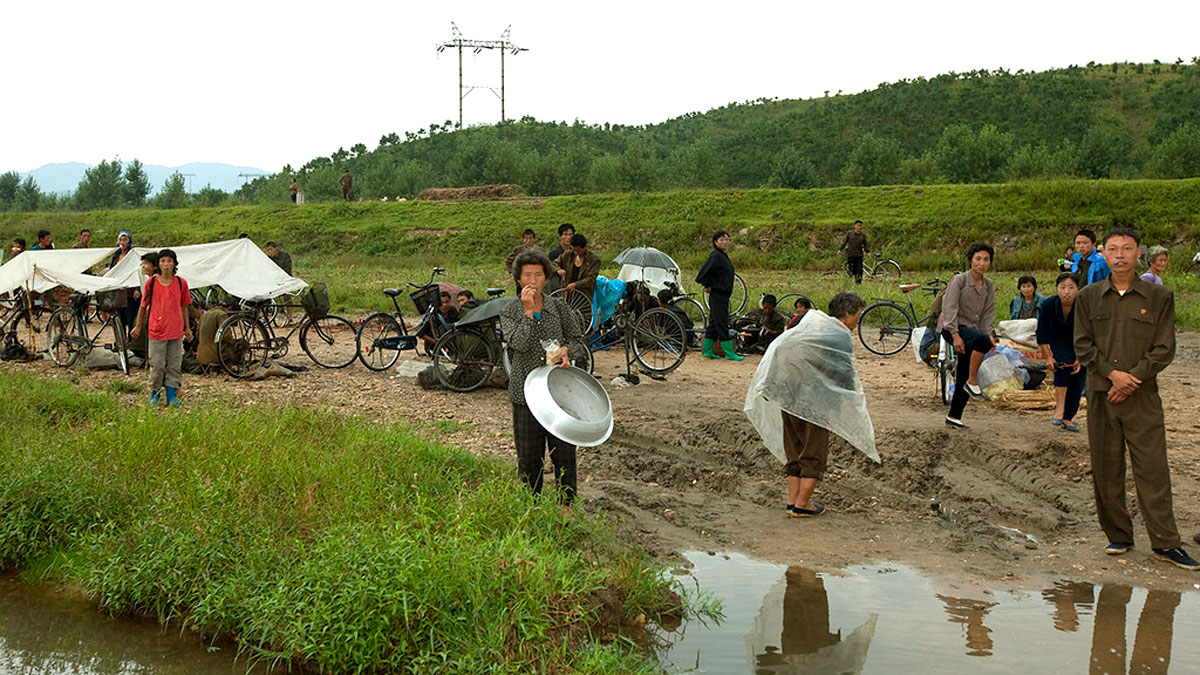
A Ripple Effect
Along with money, North Korean refugees send back news and information from the outside world. At first, family members back home may not want to hear about life beyond the border. Decades of propaganda villainizing the outside world can be difficult to overcome, and if caught in communication with defectors, they could face serious punishment.
But as money continues to flow in, many people can’t help but be curious- what do their relatives outside do to make a living? What kind of house do they live in? Is life there like the K-dramas smuggled into North Korea? Conversely, defectors ask their family members, what they can do with the money in North Korea? This exchange of information is incredibly valuable, providing a glimpse into the most closed society on earth.
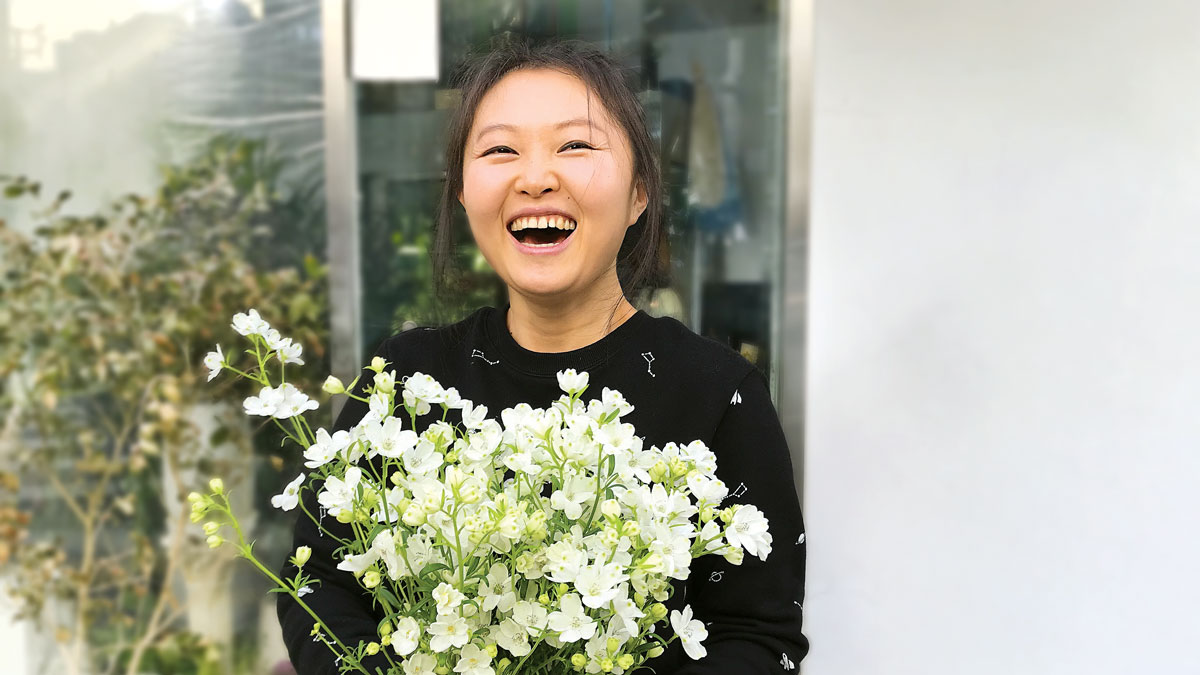
The flow of information into North Korea erodes the regime’s propaganda and changes worldviews. As the people learn more about the wealth and opportunities of the outside world, some may also risk their lives to escape. Money sent from remittances can also be used to fund this dangerous journey.
“When I first contacted my family back in North Korea after I resettled in South Korea, they didn’t believe that I was doing well here. My parents even resented me a little for leaving. But after I sent them money and told them more about my life here, their views changed. Now they realize that the regime has been lying to them and they’re not as loyal anymore. I have become a pioneer of freedom to my family back in North Korea.”
– Jo Eun, rescued by LiNK in 2017
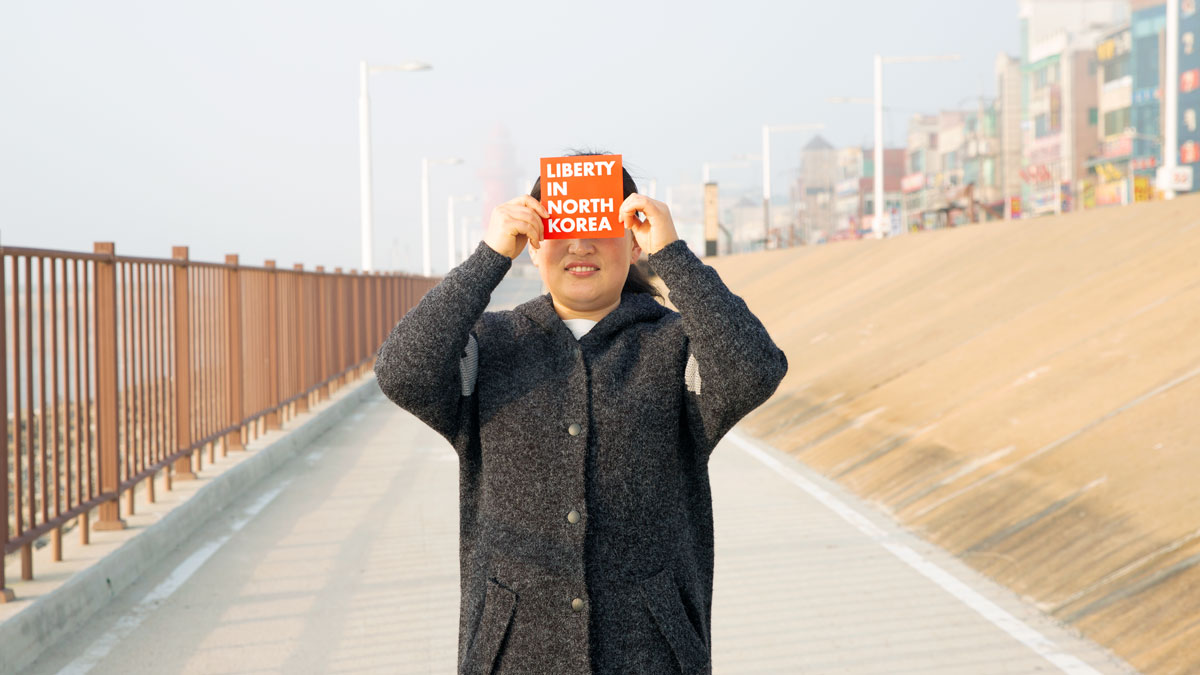
Agents of Change
Remittances are about more than just the movement of money. Refugees who have been separated from their families aren’t able to go back home themselves, but can still care for their loved ones in some way. Every phone call into the country and every dollar sent back represents one small step towards the day when the North Korean people finally achieve their freedom.
More than 33,000 North Korean refugees have made it to freedom, and although it has become more difficult during the pandemic, surveys report that 65.7% have sent money back to North Korea. At LiNK, we’re committed to working with and building the capacity of North Korean refugees so they can succeed in their new lives and make an even bigger impact in their communities and on this issue.




